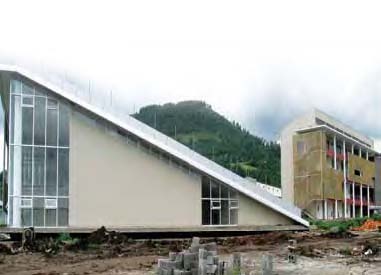|
|
Values, Vision and Mission (Charter)
Values
The University College believes in goodwill to humankind and to nature and in the concretization of this concern as a step to making the world a community of hope, justice, peace and progress. The University College holds dear the advancement of liberal education as a means of personal and social transformation and regards the provision of education to all as an important public responsibility.
Vision
The vision of the University College is to contribute to the renewal and transformation of society through knowledge and value based education and graduates who can make a difference using what they had gained in the university college.
Mission
The University College, having a mission to provide aspiring leaders the option of pursuing world-class education without leaving their country and cultural setting, shall enable the development of leaders, who being capable of independent work, problem solving, analysis, innovation and reflection, can make a difference in the development of society and in mutually and sustainably supportive relations between man and nature.
Mission Statement
Developing leadership for a world of hope
Objectives
The university college has the following objectives to realize the above mission.
1. Academic Excellence
- Develop a highly competitive academic community where there is focus on learning, inquiry, reflection, intense pursuit of knowledge and intellectual achievement that is marked not only by transfer and ingestion of knowledge but also by intelligence development for the furtherance of new knowledge.
- Provide an intellectual background that qualifies one for further academic and/or professional pursuits.
- Enable capacity for critical thinking, personal responsibility for one’s intellectual growth and maturity, skills for clear communication, keen aesthetic awareness and appreciation and understanding of key concepts within various disciplines.
2. Professional Capacity
- Develop internationally competitive professionals in the fields of focus.
- Develop professionals that can adapt their know how to local situations and make a difference in the socio-economic life of local communities.
- Advance professional ethics that sustains respect and value for the profession, the professional and the community for whom who stands to serve.
- Impart professional know how that adds value to student intellectual development on one hand and places of engagement at work and in private and public lives.
- Yield graduates that can add value in their professional engagements, private and public lives and in society at large.
3. Values Maturity
- Challenge students to confront their values, attitudes and behavior with an ethical spectacle that emphasizes public interest and investment in the community ahead of the pursuit of self interest.
- Open up students to a well ordered value structure that emphasizes attitudinal transformation befitting of the demands of the times and the needs of communities.
- Help develop a well integrated character that is highly sensitive to both rights and obligations, is committed particularly to the less fortunate and
- Uphold to personal ethics abstaining from immoral behavior, dishonesty and conduct that hurts or exploits others.
4. Community Service
- Develop an ethics of indebtedness to communities and country and commitment to service to the same.
- Link the students of the university college with the community for mutual learning and progress.
- Require and inspire both the faculty and students to relate their academic pursuits to the needs of the community through on going exchanges, field work and outcomes that propel and support community development and enable the development of ideas and models that can readily be useful in both learning and development.
- Develop human capital that is committed to the service of society and nature.
5. Research
- Serve as a center of research on particularly topics that add value to community and national development.
- Share findings of research with the academic community and those interested in the knowledge gained.
- Experiment with research findings that can be applied for use and share the know how with those interested for replication.
6. Enabling Environment for Learning and Holistic Personal
Development
- Provide adequate, high standard and inspiring buildings and grounds, facilities, learning resources and psycho-social settings that meet the teaching, learning, administrative and student personnel requirements with transformational impacts.
- Provide an inspiring and invigorating campus by putting in place an ambient, spacious, refreshing and environmentally friendly setting.
7. Linkage of the Graduates with the Job Market and Societal Needs
- Provide opportunities for the exploration of one’s interest and potential early enough so that one will pursue an area of study that is both relevant and in line with one’s interest or proclivity.
- Avail a linking pin with the job market through strong job placement service.
- Receive feedback about the quality and relevance of the educational program from various stakeholders and the local and global market and adjust one’s focus according to demands and felt needs.
- Engage in an iterative process checking the validity of the institution’s offerings with the changes in the knowledge industry.
8. Attentiveness to Nature
- Underscore an appreciation for the interdependence of man and nature and instill a culture of environmental friendliness.
- Emphasize the restoration and renewal of nature and help develop and promote alternative energy and survival sources that do not degrade the environment or hamper the restoration of the same.
|
|